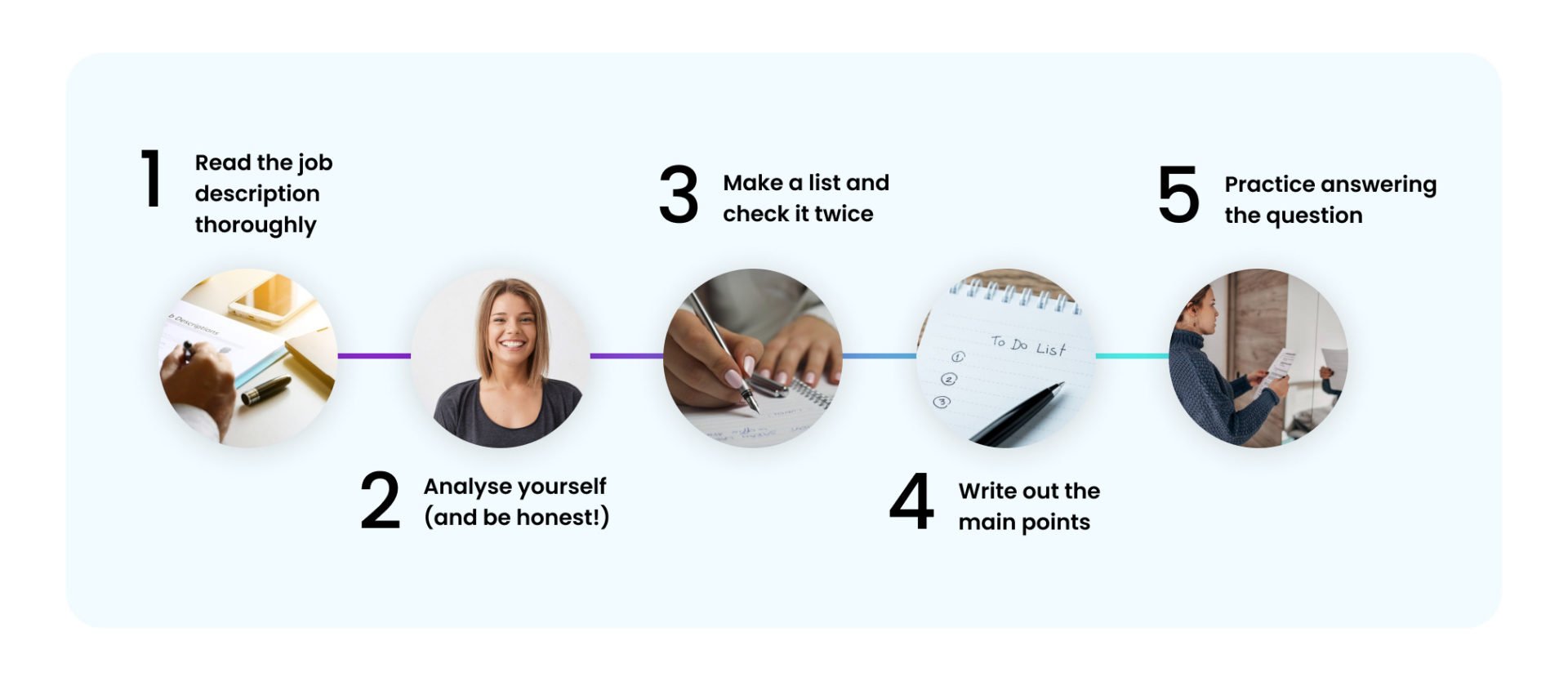
What is your biggest weakness? If you can’t answer this question off the top of your head with complete confidence, you know you’ve got some preparing to do! This is one of the most common interview questions out there, paired with a follow-up that usually goes like, “how did you overcome it?”
We’ll be honest, this is tricky to answer. The interview question seems to put you in a bind amid your bid to present yourself as a strong candidate for a new job. It’s challenging, and if you are not prepared, it can be a tragic interview.
And this is not because you lack qualifications, skills, or experience that landed you an interview in the first place; it’s just that you might fumble and say the wrong things. Mistakes like these made during a job interview are often the reason why interviewees don’t get hired despite being qualified. It’s taxing to really think about it, and this is why you really have to prepare.
In order to prove to your interviewer that your biggest weaknesses can be your greatest strengths, you’ll need to focus on three very important areas:
- What not to do
- What to do
- Preparation
In this installation of our ongoing Interview Insights series, we’re going to give you the full, step-by-step breakdown so you can answer this question like a total pro and come out looking better than you did going in!
Let’s get to it, starting with the faux pas.
What you should not do
- Stating your strengths ‘disguised’ as weaknesses: Don’t do it. This might’ve been acceptable in 2012, but unfortunately, it’s just viewed as corny in the present day. Through interviews, employers learn more about you to assess whether you’ll fit well into the organisation.
Often, the questions are solely to gauge if you are the ideal candidate for the culture they have created. These questions are based on your attitude, personality, and other things they are looking for. So, if you think you’ll get away with saying that being a ‘perfectionist’ or a ‘hard worker’ are your biggest weaknesses, think again! - Lying (or being overly honest): Just be honest — but not too honest. There’s a thin grey line you need to stick to and if you’re unsure about where that line lies, that’s where this blog is going to help you. Lying about your weaknesses, underplaying them, etc., will only come back to bite you in the future.
On the other hand, being overly honest could jeopardise your chances of securing the job. Put yourself in your employer’s shoes. If you were looking to hire an illustrator and they stated their weakness is hating digital art mediums and that they put in minimal effort into digital illustrations because of it, how secure would you feel in hiring them?
- Being uncertain about your weaknesses: Showing uncertainty might actually betray the wrong kind of weaknesses to your interviewer. You need to show them that you understand yourself, shortcomings and all, and that you’re working towards continuous improvement (which we’ll discuss in the next point). You won’t be able to accomplish this if you hum and haw in response.
- Not showing steps to improve on them: Your interviewer doesn’t want to know your weaknesses because they’re obsessed with you and want to be buddies. Unfortunately, there is an end goal to this line of questioning. They want to see how aware you are of your weaknesses and what you are doing to rectify them and improve yourself. You need to show them your growth, skills and intellect, and answering this question is a great opportunity to highlight how you overcome obstacles that have more to do with “you” then “them”.
- Presenting irrelevant weaknesses: Remember when we spoke about uncertainty? Another thing uncertainty leads to is irrelevance. Picture this conversation.
Interviewer: “What is your greatest weakness?”
Interviewee: “I’ve never really thought about it.”
Interviewer: “What comes to mind?”
Interviewee: “Honestly, not sure, but it could be that I can’t stop snacking on whole chunks of cheese in the middle of the night.”
No, this isn’t a joke. This is an actual thing said by a real person. Me.
Again, they aren’t your friends, this is a professional space, and they want you to give them information about how you would function in a working environment. So, remember to keep in relevant (and don’t mention your cheese addictions).
What you should do
- Understand the purpose of this question:
To sum it up, when a hiring manager asks you to pinpoint a weakness, describe a difficult situation, or recount a failure, they want to know the challenges, mistakes, or weak points that should not impede you from doing the responsibilities of the job. They also want to know the steps that you took or are taking to correct, overcome, and improve in those areas.
Here are other variations of the classic interview question that you can expect:
- What is your biggest weakness?
- What is your biggest weakness/strength?
- What are your strengths and weaknesses?
- Cite a mistake and what you did to make it right.
Ideally, you can paint them a picture so they can properly visualise your story. So, if you are asked to mention both your strengths and weaknesses, start with the weaknesses. Bringing that up first and then the strengths makes a strong conclusion.
- Know yourself and be honest:
Truthfully, the first step to knowing your weaknesses is to acknowledge that you have them. Nobody is perfect is as cliche as it is true. Being able to recognise that you have flaws is a sign of inner strength.
If you are unsure of your not-so-great qualities or whether they are considered flaws, ask your friends and family. Think of the feedback or criticism you received from your boss and how you turned things around — that could be a great story to share with the interviewer.
- Choose a weakness that will not sabotage your chances:
With the data, you have gathered from your introspection and other people, especially those in the workplace, it’s time to develop a list of weaknesses. Your shortlisted weaknesses can fall under two broad categories of skills:
- Soft skills, like shyness, being disorganised or paying too much attention to details
- Hard skills, like struggles with Math or written communication
The tricky part in all of these is selecting the “wrong” weakness, which is a skill or trait required by the job you are applying for. Imagine saying that you have poor people skills when you are being interviewed for a public relations post. Unless you can make a success story out of it and prove that it’s no longer an issue, your answer can cast doubts on your ability to do the job properly.
- Thoroughly analyse the job description:
To avoid putting yourself in that complicated situation above, check the job description. It usually sets out the duties, requirements, and skills that a candidate must possess.
Additional research, such as information from employees who hold/held similar roles, can help you understand what is expected from you. The process of eliminating weaknesses that can be incriminating and going for one or two that are not core requirements of the job thus becomes easier.

Preparation
The best way to prepare yourself fully for this question is to practice some demo responses to this question by yourself! This is the most critical yet exciting part of this exercise.
Formulating the actual answer involves organising the details in a way that it comes across as sincere and satisfactory, but don’t forget our advice from the previous section! It all comes together to mould the perfect answer.
To put it simply, you must first read the job description, so you know what to look for. Secondly, you must analyse yourself and be honest about your weaknesses. Next, you’ll want to start jotting down a list. Check it once, check it twice and cross out any weaknesses that seem irrelevant or those that might ruin your chances of getting the role!
Next, take the remaining points and weave a narrative. Just points, no lengthy paragraphs! And this is the framework for your answer.
Last step is to practice! When you’re practicing answering the question, follow this simple structure:
- Name your greatest weakness, and explain. (You can choose an area for improvement or a goal that you wish to achieve for professional growth.)
- Relate what you’ve been doing to address the weakness. (It can be taking courses, watching video tutorials, adopting new strategies, and so on.)
- Reveal the actual results of the actions you’ve taken or their projected outcomes. (You can also add realisations or takeaways that are positive.)
Try not to use overused statements, as well as those that come off as vague. Here are examples:
- My greatest weakness is I am a perfectionist or I’m a workaholic. (We already mentioned earlier on that this isn’t going to work anymore!)
- I don’t have weaknesses. You’re not Thanos, and even if you were, we all watched the movie and we all learned what his weakness is (was?). We also learned to never mess with Thor …
- Hiring managers have heard enough of those declarations, and unless you can employ a fresh approach or come up with a compelling narrative, it’s better to respond in your own words.
Final thoughts
By embracing that you are human with weaknesses, you can and will be able to handle the question better. Exposing a weak side doesn’t have to put you in a vulnerable position for as long you have come prepared per the tips above.
Your attitude also plays a role in the success of answering the question. Be honest without sounding like you are confessing. Remember, nothing can beat the truth. Maintain a professional stance when talking about a personal matter. More importantly, face the question so that you can move forward.
The best answer to the greatest weakness question has to do with a how. Find out how you can produce a powerful response to one of the most difficult interview questions and an ability to look to others to provide you with the resources necessary for growth.
Don’t be arrogant and don’t underestimate yourself. Check out our blog on the STAR method for the handiest tool that’ll help you ace every interview question like a pro!
All the best on your interview



